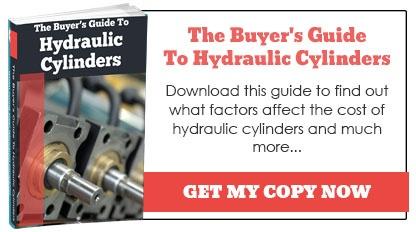
Hydraulic cylinders are designed to handle specific loads and operate under demanding conditions. As precise tension and compression bearing components, even the slightest mechanical issue can render them useless. This invariably has wider implications for the application itself.
We cannot over emphasise the importance of quality and correct design when sourcing hydraulic cylinders. However, it is not uncommon for resellers to offer standard specification hydraulic cylinders at low prices, without verifying the requirements of the manufacturer. These cylinders might work well, but are never specifically designed for the required project. In a mechanical system, even a slight performance variant can trigger a fault. It therefore goes without saying that buying the right hydraulic cylinders can make all the difference to everyone’s safety.
Risks Associated With Using The Wrong Type Of Hydraulic Cylinder
Using the wrong type of hydraulic cylinder in an application can quickly cause mechanical faults to occur. Here some of the main outcomes and why you should be wary of buying the wrong hydraulic cylinders:
1) Seal Leakage
Leaking seals are the most common trait of faulty hydraulic cylinders, which can eventually lead to bigger problems. Incorrect fitting, inappropriate metalwork clearances and low quality construction materials can all contribute to leakage. Low quality cylinders can also be subject to corrosion, again contributing to seal degradation. Leakage can cause significant damage in hydraulic systems, and so it is important to source the correct type of cylinder for your application, at the highest possible quality. Search around for the best hydraulic cylinder information from a reputable manufacturer, before you place an order.
2) Broken Eye Bearing
Using the wrong type of hydraulic cylinder can quickly result in broken eye bearings. This can happen when a cylinder is subjected to a load above its specified limit. High pressures can break the eye bearing and if the cylinder is used again, this can cause the equipment to malfunction. Gathering adequate information about the load-bearing parameters of your application before approaching a hydraulic cylinder manufacturer is the best way of ensuring your components are suitable for their purpose.
3) Adverse Chemical Reactions
Some manufacturers fail to mention the chemicals that can react negatively with a hydraulic cylinder. Some seal materials are incompatible with various chemicals, whether in fluid or gaseous form. Using an incompatible material in a hydraulic system damages your components and can cause the seals to fail.
4) Damaged Rods & Rod Bearings
Damaged rods & rod bearings are a common cause of hydraulic cylinder failure. This can occur for a number of reasons, but the most common is incorrect storage. Due care and attention should be taken when storing and transporting hydraulic cylinders. Check with your manufacturer/supplier to ensure your components are prepared and stored correctly prior to delivery.
Take No Chances With Your Hydraulic Cylinders
At Ranger Caradoc we design and manufacture precision hydraulic cylinders for a wide range of applications. We specialise in bespoke orders, creating precision components to accommodate precise loads, force outputs and operating environments. Having been in the precision engineering business since 1977, we bring to the table over 40 years manufacturing experience, so you can have complete peace of mind that your cylinders will be fit for purpose.
To find out more about hydraulic cylinders, please click here to download our free Buyer's Guide To Hydraulic Cylinders, which contains useful information about design specifications, materials and other topics. For all other questions, please get in touch with one of our technical sales team today.






